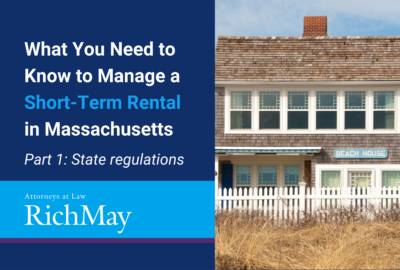What You Need to Know to Manage a Short-Term Rental in Massachusetts – State Level Regulation
In recent years, there has been a surge in demand for short term rentals. The emergence of hosting platforms like Airbnb and VRBO has enabled people to easily rent out their properties to create a new income stream. But as the short-term rental market has expanded in Massachusetts, both the state and local governments have increasingly sought to regulate it. In this article, we will focus on state-level regulations for short-term rentals in Massachusetts. In future articles in this series, we will look at more local regulations, and present a case study from our work representing clients in this area.
What Qualifies as A Short-Term Rental Under Massachusetts Law?
Under Massachusetts state regulation, a short-term rental facility is defined as a property that is not a hotel, motel, lodging house or bed and breakfast establishment, where at least one room or unit is rented to an occupant or sub-occupant for 31 consecutive calendar days or less. Any rental longer than that period falls outside the short-term rental regulations and is subject to traditional landlord-tenant law and regulations. It is worth mentioning that each municipality can establish its own definitions of short-term rentals; for example, the City of Boston defines a short-term rental as any rental shorter than 28 days, which will be discussed more in a future article.
Requirements for Legally Operating a Short-Term Rental under Massachusetts Law.
In 2019, Massachusetts enacted the Room Occupancy Excise law (“MROE”). Under MROE, short-term rental operators must register with the Massachusetts Department of Revenue via MassTaxConnect to pay state and local room occupancy excise taxes and any applicable local fees. All short-term rentals fall under the state’s room occupancy excise tax regime (historically applicable to hotels and motels), which includes a 5.7% base state tax and may include an additional local tax of up to 6.5% depending on the municipality. Operators managing multiple units in one municipality, or renting parts of an owner-occupied 2 or 3 family house, may also be subject to Community Impact Fees of up to 3%.
MROE also requires all short-term rental facilities to carry liability insurance with a minimum of $1 million in liability coverage, unless the applicable short-term rental platform has its own insurance policy providing such coverage. An operator must also inform their insurer that the property is used for short-term rentals.
Owners should engage with their legal counsel and insurance agent to ensure that they are in compliance with MROE, to avoid potential fines and legal issues. Apart from the above-mentioned state regulations, short-term rental owners should also pay attention to any applicable local level regulations. Most cities and towns in Massachusetts have passed local zoning bylaws concerning short-term rentals. Beyond that, if the short-term rental unit is part of a condominium, the condominium documents may include provisions governing this use. Check back for future articles covering more local topics.
If you have questions about the regulation of short-term rental properties, please feel free to contact Jim Heffernan, David Glod or Yana Zheng.
Disclaimer: This summary is provided for educational and informational purposes only and is not legal advice. Any specific questions about these topics should be directed to attorney(s) Jim Heffernan, David Glod and/or Yana Zheng.
© 2025 by Rich May, P.C. and Jim Heffernan, David Glod and Yana Zheng. All rights reserved.


